 P2P network, BitTorrent has signed an agreement with the Motion Picture Association of America to collaborate on stopping Internet piracy.
P2P network, BitTorrent has signed an agreement with the Motion Picture Association of America to collaborate on stopping Internet piracy.
After a press conference, a joint release was released by BitTorrent founder and CEO Bram Cohen and MPAA chairman and CEO Dan Glickman announcing that BitTorrent have agreed to remove all links directing users to pirated content owned by the seven MPAA member companies.
The agreement will effectively prevent bittorrent.com from locating unlicensed versions of popular movies, making it harder for freeloaders to find online illegal copies of films.
“BitTorrent is an extremely efficient publishing tool and search engine that allows creators and rights holders to make their content available on the Internet securely,” Cohen said.
 “BitTorrent Inc. discourages the use of its technology for distributing films without a license to do so. As such, we are pleased to work with the film industry to remove unauthorised content from BitTorrent.com’s search engine,” he added.
“BitTorrent Inc. discourages the use of its technology for distributing films without a license to do so. As such, we are pleased to work with the film industry to remove unauthorised content from BitTorrent.com’s search engine,” he added.
Thousand of BitTorrent fans the world over will be clenching their fists and shouting “Traitor! You’re doing deals with the Devil,” while other more balanced, less angry-types will be saying “Smart move Bram, you’ve built a technology that they cannot stop and the fact they’ve done a deal with you proves that. Hey and you’re not getting your shirt sued off your back.”
In September, Cohen revealed that his company had raked in $8.75 million in venture funding to develop commercial distribution tools for media companies, and the MPAA deal looks to be part of a strategy to make the technology more attractive to Hollywood moguls – no doubt with an eye to future lucrative movie download deals.
With an estimated 45 million users, the BitTorrent technology pioneered by Cohen does its clever stuff by assembling digital files from separate bits of data downloaded from computer users all across the Internet.
The decentralised nature of technology makes it the easiest, most convenient way to fill your hard drive with dodgy movies galore, while making it harder for Hollywood to find and identify the movie swappers.
In an attempt to stop the piracy, the MPAA has been slapping lawsuits around like confetti during the last year, successfully closing down 90% of targeted sites using the BitTorrent protocol for illegal distribution of movies.
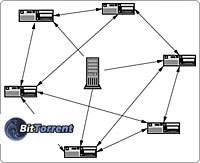 The MPAA claims that the film industry lost $3.5 billion to movie piracy last year, with a recent study predicting the figure to jump to $5.4 billion this year. The MPAA claim these losses are excluding revenue lost through online file-swapping, so the true figure could be even higher (although other will say the figures are already gloriously exaggerated).
The MPAA claims that the film industry lost $3.5 billion to movie piracy last year, with a recent study predicting the figure to jump to $5.4 billion this year. The MPAA claim these losses are excluding revenue lost through online file-swapping, so the true figure could be even higher (although other will say the figures are already gloriously exaggerated).
With tears welling up in their eyes, the MPAA said that film copying hurts hundreds of thousands of employees dependent on the movie industry, including sound and lighting techies, carpenters, cinema staff, video store employees and quite probably the popcorn sales assistant too.
But not, we suspect, the fatcat industry bigwigs.
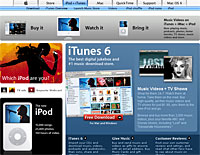 Apple’s iTunes online store has been ranked the seventh-largest music retailer in the US in the third quarter, charging into the top 10 for the first time.
Apple’s iTunes online store has been ranked the seventh-largest music retailer in the US in the third quarter, charging into the top 10 for the first time.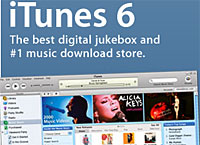 Already eating iTunes’ dust are big names like Tower Records and Borders, reflecting music fans’ growing passion for online music.
Already eating iTunes’ dust are big names like Tower Records and Borders, reflecting music fans’ growing passion for online music.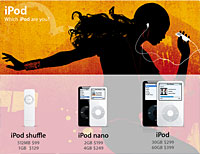 Combined revenue from the iPod, Apple’s fastest- selling product, and iTunes music accounted for a massive 40 percent of sales last quarter, up from 27 percent a year earlier.
Combined revenue from the iPod, Apple’s fastest- selling product, and iTunes music accounted for a massive 40 percent of sales last quarter, up from 27 percent a year earlier. Convergence took a step forward Friday past as Cisco announced the takeover of Scientific Atlanta (SA). The price? $6.9 billion cash.
Convergence took a step forward Friday past as Cisco announced the takeover of Scientific Atlanta (SA). The price? $6.9 billion cash. The acquisition looks a good fit though, Cisco are keen to push their IPTV proposition, SA’s strength in the US set-top-box market (they have around 40% market share) will allow them to capitalise on the access to the home that video brings. The companies’ combined news release majors on this, John Chambers, president and chief executive officer of Cisco Systems said “Video is emerging as the key strategic application in the service provider triple play bundle of consumer entertainment, communication and online services.”
The acquisition looks a good fit though, Cisco are keen to push their IPTV proposition, SA’s strength in the US set-top-box market (they have around 40% market share) will allow them to capitalise on the access to the home that video brings. The companies’ combined news release majors on this, John Chambers, president and chief executive officer of Cisco Systems said “Video is emerging as the key strategic application in the service provider triple play bundle of consumer entertainment, communication and online services.” Formed in 1951, SA has long been a market leader in Cable TV, has a healthy balance sheet and already has one large IPTV customer in the shape of SBC Communications. The critical mass of SA as part of Cisco should help it win more.
Formed in 1951, SA has long been a market leader in Cable TV, has a healthy balance sheet and already has one large IPTV customer in the shape of SBC Communications. The critical mass of SA as part of Cisco should help it win more. Grokster, the online music sharing service, much legally embattled, has decided to shut the service and pay $50 million to settle claims against it.
Grokster, the online music sharing service, much legally embattled, has decided to shut the service and pay $50 million to settle claims against it.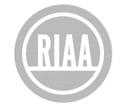 There is a plan to launch a service that they say will be a “safe and legal service” under the name Grokster 3G.
There is a plan to launch a service that they say will be a “safe and legal service” under the name Grokster 3G. Mobile phone heavyweights Motorola, have reported bumper earnings for the third quarter, with profits more than tripling after record sales.
Mobile phone heavyweights Motorola, have reported bumper earnings for the third quarter, with profits more than tripling after record sales.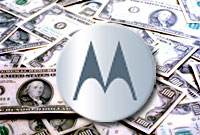 Handsets were up 41% year-on-year with quarterly sales soaring 26% to a new high of $9.42bn, from $7.5bn for the same period in 2004.
Handsets were up 41% year-on-year with quarterly sales soaring 26% to a new high of $9.42bn, from $7.5bn for the same period in 2004. “We are very excited about our third quarter results and overall performance year-to-date… Excluding re-organisation charges, all four of Motorola’s businesses grew profitably during the quarter,” said a deeply chuffed Zander.
“We are very excited about our third quarter results and overall performance year-to-date… Excluding re-organisation charges, all four of Motorola’s businesses grew profitably during the quarter,” said a deeply chuffed Zander. Leo Kuvayev, the leader of the largest Spam gang, and six of his business partners have been handed a $37m (~E30m, ~£21m) fine by the courts in Massachusetts.
Leo Kuvayev, the leader of the largest Spam gang, and six of his business partners have been handed a $37m (~E30m, ~£21m) fine by the courts in Massachusetts. This was no small operation. Microsoft collected more than 45,000 spam messages believed to be from the Internet Spam Gang in just 22 days between 12 June and 4 July 2004. Not bad, with an average of 2,000 emails per day.
This was no small operation. Microsoft collected more than 45,000 spam messages believed to be from the Internet Spam Gang in just 22 days between 12 June and 4 July 2004. Not bad, with an average of 2,000 emails per day. He appears very enterprising, does’t he? He’s also listed as the 2nd worst spammer on the
He appears very enterprising, does’t he? He’s also listed as the 2nd worst spammer on the  A new study has revealed that one in five Americans is without home Internet access and have never been online, potentially hindering their access to crucial information and services.
A new study has revealed that one in five Americans is without home Internet access and have never been online, potentially hindering their access to crucial information and services. Not surprisingly, the study also found that people with lower incomes and less education also registered lower percentages of Internet adoption.
Not surprisingly, the study also found that people with lower incomes and less education also registered lower percentages of Internet adoption.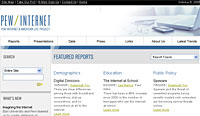 Broadband makes it easier for surfers to whiz around the Web and download music, view videos, enjoy free VoIP calls and access online services and important information on topics like health and finance.
Broadband makes it easier for surfers to whiz around the Web and download music, view videos, enjoy free VoIP calls and access online services and important information on topics like health and finance. Handy… Literally!
Handy… Literally! Sounds nasty!
Sounds nasty!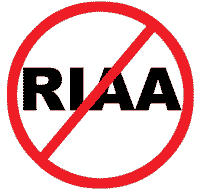 That lot again
That lot again Sony’s Playstation has been awarded an Emmy for Outstanding Achievement in Technology and Advanced New Media for pioneering the 3D polygonal-based gaming experience, by the US National Academy of Television Arts and Sciences (NATAS).
Sony’s Playstation has been awarded an Emmy for Outstanding Achievement in Technology and Advanced New Media for pioneering the 3D polygonal-based gaming experience, by the US National Academy of Television Arts and Sciences (NATAS). You can imagine that the awarding of this will make steam come out of the ears of those on the Xbox team at Microsoft
You can imagine that the awarding of this will make steam come out of the ears of those on the Xbox team at Microsoft Is it only the cynical that would think that the timing of this award has anything to do with the wider entertainment business (read film) getting more closely involved with creation of film license games? Or even that they’ve finally woken up to the fact that the amount of money spent on video games out-sizes that spent on film.
Is it only the cynical that would think that the timing of this award has anything to do with the wider entertainment business (read film) getting more closely involved with creation of film license games? Or even that they’ve finally woken up to the fact that the amount of money spent on video games out-sizes that spent on film. Verizon has launched an IPTV service in Keller, Texas delivered over their fiber-to-the-premises network.
Verizon has launched an IPTV service in Keller, Texas delivered over their fiber-to-the-premises network. Verizon are offers three set-top boxes: standard definition for $3.95/month; HD for $9.95/month; and a digital video recorder set-top box with HD channels for $12.95 permonth. Content packages between $13/month – $40/month are layer on top of this.
Verizon are offers three set-top boxes: standard definition for $3.95/month; HD for $9.95/month; and a digital video recorder set-top box with HD channels for $12.95 permonth. Content packages between $13/month – $40/month are layer on top of this.